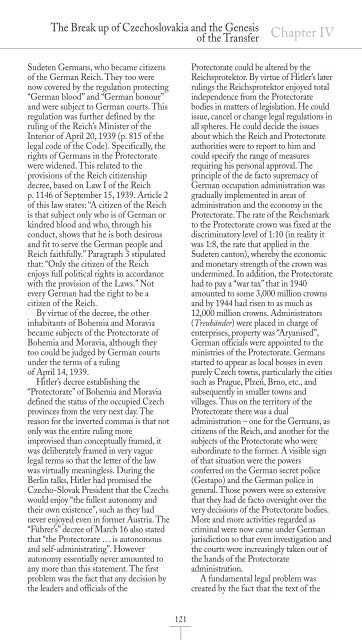the nationality of all inhabitants of the czech provinces and ...
the nationality of all inhabitants of the czech provinces and ...
the nationality of all inhabitants of the czech provinces and ...
Create successful ePaper yourself
Turn your PDF publications into a flip-book with our unique Google optimized e-Paper software.
The Break up <strong>of</strong> Czechoslovakia <strong>and</strong> <strong>the</strong> Genesis<br />
<strong>of</strong> <strong>the</strong> Transfer<br />
Sudeten Germans, who became citizens<br />
<strong>of</strong> <strong>the</strong> German Reich. They too were<br />
now covered by <strong>the</strong> regulation protecting<br />
“German blood” <strong>and</strong> “German honour”<br />
<strong>and</strong> were subject to German courts. This<br />
regulation was fur<strong>the</strong>r defined by <strong>the</strong><br />
ruling <strong>of</strong> <strong>the</strong> Reich’s Minister <strong>of</strong> <strong>the</strong><br />
Interior <strong>of</strong> April 20, 1939 (p. 815 <strong>of</strong> <strong>the</strong><br />
legal code <strong>of</strong> <strong>the</strong> Code). Specific<strong>all</strong>y, <strong>the</strong><br />
rights <strong>of</strong> Germans in <strong>the</strong> Protectorate<br />
were widened. This related to <strong>the</strong><br />
provisions <strong>of</strong> <strong>the</strong> Reich citizenship<br />
decree, based on Law I <strong>of</strong> <strong>the</strong> Reich<br />
p. 1146 <strong>of</strong> September 15, 1939. Article 2<br />
<strong>of</strong> this law states: “A citizen <strong>of</strong> <strong>the</strong> Reich<br />
is that subject only who is <strong>of</strong> German or<br />
kindred blood <strong>and</strong> who, through his<br />
conduct, shows that he is both desirous<br />
<strong>and</strong> fit to serve <strong>the</strong> German people <strong>and</strong><br />
Reich faithfully.” Paragraph 3 stipulated<br />
that: “Only <strong>the</strong> citizen <strong>of</strong> <strong>the</strong> Reich<br />
enjoys full political rights in accordance<br />
with <strong>the</strong> provision <strong>of</strong> <strong>the</strong> Laws.” Not<br />
every German had <strong>the</strong> right to be a<br />
citizen <strong>of</strong> <strong>the</strong> Reich.<br />
By virtue <strong>of</strong> <strong>the</strong> decree, <strong>the</strong> o<strong>the</strong>r<br />
<strong>inhabitants</strong> <strong>of</strong> Bohemia <strong>and</strong> Moravia<br />
became subjects <strong>of</strong> <strong>the</strong> Protectorate <strong>of</strong><br />
Bohemia <strong>and</strong> Moravia, although <strong>the</strong>y<br />
too could be judged by German courts<br />
under <strong>the</strong> terms <strong>of</strong> a ruling<br />
<strong>of</strong> April 14, 1939.<br />
Hitler’s decree establishing <strong>the</strong><br />
“Protectorate” <strong>of</strong> Bohemia <strong>and</strong> Moravia<br />
defined <strong>the</strong> status <strong>of</strong> <strong>the</strong> occupied Czech<br />
<strong>provinces</strong> from <strong>the</strong> very next day. The<br />
reason for <strong>the</strong> inverted commas is that not<br />
only was <strong>the</strong> entire ruling more<br />
improvised than conceptu<strong>all</strong>y framed, it<br />
was deliberately framed in very vague<br />
legal terms so that <strong>the</strong> letter <strong>of</strong> <strong>the</strong> law<br />
was virtu<strong>all</strong>y meaningless. During <strong>the</strong><br />
Berlin talks, Hitler had promised <strong>the</strong><br />
Czecho-Slovak President that <strong>the</strong> Czechs<br />
would enjoy “<strong>the</strong> fullest autonomy <strong>and</strong><br />
<strong>the</strong>ir own existence”, such as <strong>the</strong>y had<br />
never enjoyed even in former Austria. The<br />
“Führer’s” decree <strong>of</strong> March 16 also stated<br />
that “<strong>the</strong> Protectorate … is autonomous<br />
<strong>and</strong> self-administrating”. However<br />
autonomy essenti<strong>all</strong>y never amounted to<br />
any more than this statement. The first<br />
problem was <strong>the</strong> fact that any decision by<br />
<strong>the</strong> leaders <strong>and</strong> <strong>of</strong>ficials <strong>of</strong> <strong>the</strong><br />
121<br />
Chapter IV<br />
Protectorate could be altered by <strong>the</strong><br />
Reichsprotektor. By virtue <strong>of</strong> Hitler’s later<br />
rulings <strong>the</strong> Reichsprotektor enjoyed total<br />
independence from <strong>the</strong> Protectorate<br />
bodies in matters <strong>of</strong> legislation. He could<br />
issue, cancel or change legal regulations in<br />
<strong>all</strong> spheres. He could decide <strong>the</strong> issues<br />
about which <strong>the</strong> Reich <strong>and</strong> Protectorate<br />
authorities were to report to him <strong>and</strong><br />
could specify <strong>the</strong> range <strong>of</strong> measures<br />
requiring his personal approval. The<br />
principle <strong>of</strong> <strong>the</strong> de facto supremacy <strong>of</strong><br />
German occupation administration was<br />
gradu<strong>all</strong>y implemented in areas <strong>of</strong><br />
administration <strong>and</strong> <strong>the</strong> economy in <strong>the</strong><br />
Protectorate. The rate <strong>of</strong> <strong>the</strong> Reichsmark<br />
to <strong>the</strong> Protectorate crown was fixed at <strong>the</strong><br />
discriminatory level <strong>of</strong> 1:10 (in reality it<br />
was 1:8, <strong>the</strong> rate that applied in <strong>the</strong><br />
Sudeten canton), whereby <strong>the</strong> economic<br />
<strong>and</strong> monetary strength <strong>of</strong> <strong>the</strong> crown was<br />
undermined. In addition, <strong>the</strong> Protectorate<br />
had to pay a “war tax” that in 1940<br />
amounted to some 3,000 million crowns<br />
<strong>and</strong> by 1944 had risen to as much as<br />
12,000 million crowns. Administrators<br />
(Treuhänder) were placed in charge <strong>of</strong><br />
enterprises, property was “Aryanised”,<br />
German <strong>of</strong>ficials were appointed to <strong>the</strong><br />
ministries <strong>of</strong> <strong>the</strong> Protectorate. Germans<br />
started to appear as local bosses in even<br />
purely Czech towns, particularly <strong>the</strong> cities<br />
such as Prague, Plzeň, Brno, etc., <strong>and</strong><br />
subsequently in sm<strong>all</strong>er towns <strong>and</strong><br />
villages. Thus on <strong>the</strong> territory <strong>of</strong> <strong>the</strong><br />
Protectorate <strong>the</strong>re was a dual<br />
administration – one for <strong>the</strong> Germans, as<br />
citizens <strong>of</strong> <strong>the</strong> Reich, <strong>and</strong> ano<strong>the</strong>r for <strong>the</strong><br />
subjects <strong>of</strong> <strong>the</strong> Protectorate who were<br />
subordinate to <strong>the</strong> former. A visible sign<br />
<strong>of</strong> that situation were <strong>the</strong> powers<br />
conferred on <strong>the</strong> German secret police<br />
(Gestapo) <strong>and</strong> <strong>the</strong> German police in<br />
general. Those powers were so extensive<br />
that <strong>the</strong>y had de facto oversight over <strong>the</strong><br />
very decisions <strong>of</strong> <strong>the</strong> Protectorate bodies.<br />
More <strong>and</strong> more activities regarded as<br />
criminal were now came under German<br />
jurisdiction so that even investigation <strong>and</strong><br />
<strong>the</strong> courts were increasingly taken out <strong>of</strong><br />
<strong>the</strong> h<strong>and</strong>s <strong>of</strong> <strong>the</strong> Protectorate<br />
administration.<br />
A fundamental legal problem was<br />
created by <strong>the</strong> fact that <strong>the</strong> text <strong>of</strong> <strong>the</strong>


